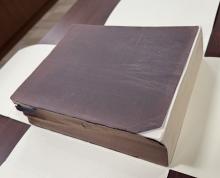Roger J. Newell, "Participatory Knowledge: Theology as Art and Science in C. S. Lewis and T. F. Torrance" (PhD dissertation, University of Aberdeen, 1983)
Newell, Roger J. "Participatory Knowledge: Theology as Art and Science in C. S. Lewis and T. F. Torrance." PhD dissertation, University of Aberdeen, 1983
Supervised by James B. Torrance. Newell writes:
"I would like to express my thanks to those who„helped me with this study. I warn them that these words only hint at my gratitude. First, I am grateful to my supervisor, Professor J. B. Torrance, for his pastoral care, scholarly counsel and for giving me the emotional freedom to disagree and criticize. I also would thank him for giving many, many students a living model of devotion to the Truth and unconditional care for others, both those to the left and right of the theological spectrum. I would like to thank T. F. Torrance for the generous amount of time he gave me one morning in Edinburgh. After immersing myself in his writings for a year, I put my questions to him and was able face to face to hear and see his integrative theological thinking. It was a great joy. Also I thank Rev. Walter Hooper, who, in spite of the personal and scholarly demands from Lewis students world over, reached into his seemingly endless hospitality to give of himself in conversation and to give access to the unpublished writings of C. S. Lewis."
Available through Dissertation Abstracts, copyright ProQuest, (UMI)AAIU346088. ProQuest document ID: 301423650.
Another version has been prepared courtesy of the author and is now available to download in the right sidebar. This PDF has been converted with OCR to searchable text. It was made by scanning Roger Newell's original copy, and did not involve use of the ProQuest version in any way. The author retains copyright on his dissertation, but it is distributed here with the author's permission.
Discussed in the Reading Group on January 28, 2021: Video.
The thesis argues that an intriguing similarity exists between the theological epistemology of C. S. Lewis, a literary critic and lay theologian, and that of T. F. Torrance, a Reformed theologian deeply concerned with the epistemological questions of modern science. Their epistemological interaction is brought to bear on several interrelated issues: the theological' roots of modern science, the nature of scientific objectivity, the nature of art and the structures of theological rationality, with particular inquiry into the roles of logic, intuition and imagination. I argue that their writings reveal a fundamental agreement on the nature of rationality, which in turn reflects universal way of knowing in the arts, sciences and theology. This agreement reinforces the validity of each of these fields of knowledge.
I call this way of knowing 'participatory knowledge’; it consists of both cognitive and feeling qualities. Its object-centred participation leads us to a realist commitment to a knowledge of objective reality and ontological structures, though not in the sense of a detached, objectivistic knowledge. From this perspective, I explore the ’field-relationship’ between science, art and theology and describe an a posteriori approach to natural theology implicit in Lewis and explicit in Torrance.
I conclude that the theological claim to know God is like a science in that a real, empirical object is known, and yet is like an art in that a qualitative experience is of the essence of this knowledge - the knowledge of the living God. The intermingling of the art and science paradigms does not exhaust our understanding of theology, but is a promise and pledge of theology’s maturity.
- Oklahoma History of Science Collections original copy donated by Roger Newell.
- 187 views

